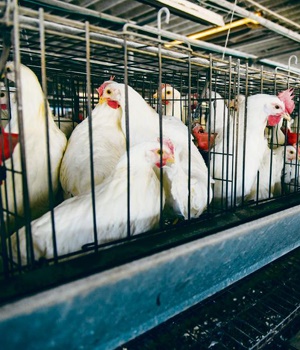
The national outcry burnt hotter than a KFC chip fryer.
Sorry to play devil’s advocate, but if you’re so absolutely appalled at the thought of chicken being rinsed on the floor, shouldn’t the fact that chickens are raised in cramped, often cruel, conditions be more of a problem?
And forget about a little dirt getting into your chicken, doesn’t the fact that you’re eating something deep fried in oil and dusted with MSG and salt not worry you more?
Although the story that KFC grows “mutant” chickens – horribly deformed due to genetic modification – turned out to be a hoax, most battery hens are pumped full of antibiotics, steroids and growth hormones.
Although KFC might say “we make it our responsibility to ensure the chickens we source are treated humanely and within the animal rights legislation of the country”, the truth is that commercial chicken farming is a profit-first enterprise, where the lives of animals come second.
South Africa has an incredible taste for fried chicken. According to statistics from four retailers collected by City Press in June last year, we consume an average of 13 million kilograms of takeaway chicken a month.
With demand that high, ever more pressure is put on producers to increase output. This often leads to cramped conditions and the need to fatten up birds as quickly as possible to shave the overall cost of feeding them.
According to animal rights activists, commercially farmed chickens are often shoved into tiny, excrement-filled cages that reek of ammonia and the birds’ legs and wings often break because they are bred to be too top-heavy and because workers carelessly shove them into transport crates.
If only people would get as worked up about their own health – and cruelty against animals – as they do about a video like this.
Nicola Harding, from a not-for-profit organisation called Rescue Battery Hens Cape Town, which “facilitates the rehoming of caged battery hens when they are due for cull at the end of their commercially viable use at the age of only 72 weeks”, feels the discussion should move away from “should we eat meat?” to “is it ethical to eat commercially farmed meat?”
Eating meat in and of itself is not the problem – the problem is the way commercially farmed animals are raised.
But KFC tastes so good, I hear you protest. Yes, sure, have your KFC and eat it too. But don’t pretend you’re surprised or even outraged by dodgy takeaway practices when there are much bigger fish (or should I say chicken) to fry.




 Publications
Publications
 Partners
Partners








